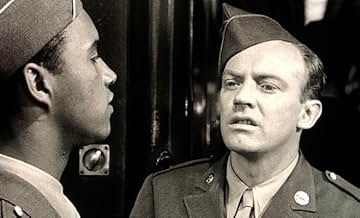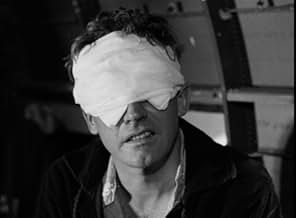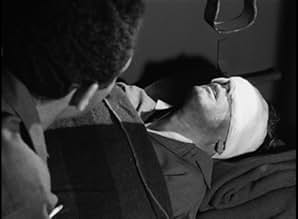IMDb RATING
7.3/10
1.1K
YOUR RATING
After he gets blinded by a German sniper's bullet in 1943, Sergeant Larry Nevins begins the long and painful road to recovery.After he gets blinded by a German sniper's bullet in 1943, Sergeant Larry Nevins begins the long and painful road to recovery.After he gets blinded by a German sniper's bullet in 1943, Sergeant Larry Nevins begins the long and painful road to recovery.
- Nominated for 2 Oscars
- 5 wins & 6 nominations total
Julie Adams
- Chris Paterson
- (as Julia Adams)
- Director
- Writers
- All cast & crew
- Production, box office & more at IMDbPro
Featured reviews
What is really interesting about this movie, is the "race" issues it addresses and for the time in which it was made, that is rather remarkable.
The Nevins character is a good old boy from the South and openly expresses his racism. The first time is when he's on the plane headed back to the states and a black soldier sits next to to him. They're both from Florida start talking. Nevins asks him if he knows the country club and the guys says he served tables at it. Nevins now realizes the guy is black and immediately calls over a nurse to sit by him.
The next time is in the rehabilitation hospital. Nevins accidentally walks into a black soldier, also blind. All Nevins recognizes is the man's southern accent and offers to buy him a drink. They become "friends" and hang out together. Then one day, the other blind soldiers mention there are some new patients coming into their ward and Nevins pops off, "Yeah, and I heard 3 of them are (uses the "N" word)". The black guys just stops in his tracks now realizing how his new friend really thinks and feels.
The other blind white soldiers already knew the guy was black and remarked "Maybe he thought you were colored too".
Later on Nevins goes home and is with his parents, who are equally racist. Nevins starts to "see" the errors of his ways/thinking. There is a bit of justification from the father that that was how they were brought up, etc., but for 1951 it is amazing they were even addressing such things let alone using the "N" word.
The Nevins character is a good old boy from the South and openly expresses his racism. The first time is when he's on the plane headed back to the states and a black soldier sits next to to him. They're both from Florida start talking. Nevins asks him if he knows the country club and the guys says he served tables at it. Nevins now realizes the guy is black and immediately calls over a nurse to sit by him.
The next time is in the rehabilitation hospital. Nevins accidentally walks into a black soldier, also blind. All Nevins recognizes is the man's southern accent and offers to buy him a drink. They become "friends" and hang out together. Then one day, the other blind soldiers mention there are some new patients coming into their ward and Nevins pops off, "Yeah, and I heard 3 of them are (uses the "N" word)". The black guys just stops in his tracks now realizing how his new friend really thinks and feels.
The other blind white soldiers already knew the guy was black and remarked "Maybe he thought you were colored too".
Later on Nevins goes home and is with his parents, who are equally racist. Nevins starts to "see" the errors of his ways/thinking. There is a bit of justification from the father that that was how they were brought up, etc., but for 1951 it is amazing they were even addressing such things let alone using the "N" word.
Poignant account of blinded war veteran adjusting to civilian life. Though the premise has built-in emotional appeal, that fine actor Arthur Kennedy prevents the tale from becoming too sappy or even sentimental. Understandably, there were a number of these "adjustment" movies made after WWII, The Best Years Of Our Lives (1946), and The Men (1950), to name two. More than the others, I think, BV follows one man's (Kennedy) difficulties in re- integrating with family, love life, and community. Naturally, films of this type sought to be uplifting and optimistic in dealing with a devastating post-war problem. BV is no exception. Then too, the racial subtext is well-handled, bringing to the surface those inner qualities that are often overridden by outer appearance. In that sense, Larry's (Kennedy) perception is ironically sharpened by blindness once he figures out the lesson.
The movie's well-made, using actual locations such as city sidewalks, VA hospitals, and train stations, all of which provide a realistic feel. Then too, what guy wouldn't like being helped along by the likes of Judy (Dow) who resembles June Allyson's sexy older sister. Too bad, her accomplished career was so short. Just as regrettable is the amazing James Edwards, one of the first Blacks to get dignified roles. Seems his pioneering career was over-shadowed by the equally charismatic Sydney Poitier.
All in all, the movie surpasses its time because of the common humanity that appeals beneath one man's courageous struggle.
The movie's well-made, using actual locations such as city sidewalks, VA hospitals, and train stations, all of which provide a realistic feel. Then too, what guy wouldn't like being helped along by the likes of Judy (Dow) who resembles June Allyson's sexy older sister. Too bad, her accomplished career was so short. Just as regrettable is the amazing James Edwards, one of the first Blacks to get dignified roles. Seems his pioneering career was over-shadowed by the equally charismatic Sydney Poitier.
All in all, the movie surpasses its time because of the common humanity that appeals beneath one man's courageous struggle.
In "Dark Victory" the lead goes blind and faces encroaching death. In "Bright Victory" the lead's already blind and faces encroaching life.
The latter seems far more challenging.
Arthur Kennedy's Oscar-nominated performance as Larry buoys this film from start to finish. His excellent naturalistic style is perfect for the returning disabled vet.
Peggy Dow (as Judy) and Julie Adams (as Chris) are both fine as the women in Larry's life. The script is so sensitively written that both female characters are totally believable in their motivations.
James Edwards delivers his usual solid work as Joe, Larry's best friend.
Mark Robson's direction is efficient and level headed, and the photography, editing and music are all extremely tasteful.
This is one of Authur Kennedy's finest hours, amongst a distinguished body of work during a most versatile career.
The latter seems far more challenging.
Arthur Kennedy's Oscar-nominated performance as Larry buoys this film from start to finish. His excellent naturalistic style is perfect for the returning disabled vet.
Peggy Dow (as Judy) and Julie Adams (as Chris) are both fine as the women in Larry's life. The script is so sensitively written that both female characters are totally believable in their motivations.
James Edwards delivers his usual solid work as Joe, Larry's best friend.
Mark Robson's direction is efficient and level headed, and the photography, editing and music are all extremely tasteful.
This is one of Authur Kennedy's finest hours, amongst a distinguished body of work during a most versatile career.
I stumbled upon this excellent and compelling film during AMC's "Veterans' Day Movie Marathon." Dealing with a soldier's (Arthur Kennedy) rehabilitation after losing his sight during WWII in surprisingly frank ways for its time (released in 1951), this seems to me to be the first time I saw raw racism and its consequences in a film. A superb love story on the surface, it's the underlying themes of classism, racism and realistically dealing with the handicapped which set it a notch above the terrific 1946 film, "The Best Years of our Lives." Face it, Harold Russell, while a hero, was no actor. The electricity between Kennedy and his new "friend" (played by Peggy Dow ~ whatever became of this talented actress? Her career lasted only 4 years) is remarkable. Happy ending doesn't detract.
Reminds me more of Pride of the Marines than Best Years of Their Lives. Blinded returning vet has to readjust. Arthur Kennedy never was better than in this movie. The ending in this cynical age seems too upbeat, but such endings DID happen. See: The Men with Brando for another crippled returning vet film.
Did you know
- TriviaThe airplane disaster that killed romantic lead actor Leslie Howard is mentioned in this film.
- GoofsThe locomotive pulling the train when Joe arrives home in Florida was not produced by American Locomotive Company until 1950, seven years after the actual event. Diesel locomotives were not used on local trains until after the war years.
- Quotes
Larry Nevins: I told ya i wanted security, remember... well I was looking for it in all the wrong places. Nobody can ever give it to you Judy. That way, it costs too much, you gotta make it for yourself.
- How long is Bright Victory?Powered by Alexa
Details
- Runtime1 hour 37 minutes
- Color
- Aspect ratio
- 1.37 : 1
Contribute to this page
Suggest an edit or add missing content



































